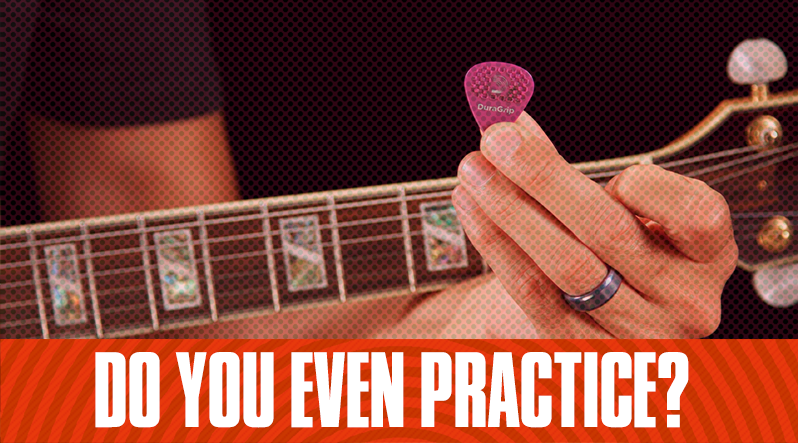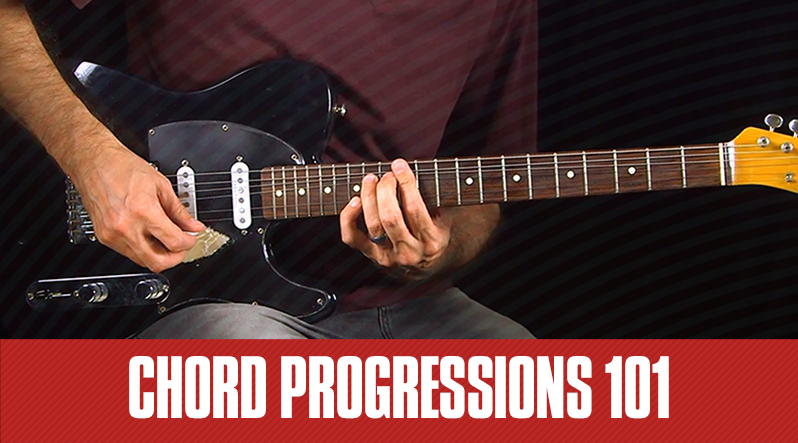Updated on April 30, 2024
Do you struggle to nail a crisp-sounding barre chord?
If so, you know firsthand how frustrating it can be to play one of these beauties without buzzing or dead strings.
Getting barre chords to resonate brightly can be a real challenge, especially for anyone taking beginner guitar lessons.
But with a little elbow grease, or rather, finger grease, and a whole lot of dedication, you can conquer the barre chord.
What Is A Barre Chord?
Playing a full barre chord (not 'bar' chord) involves pressing one of your fingers across multiple strings at once.
What makes this difficult is the tension of the strings and the dexterity needed to hold them all down at the same time to produce a chord that sounds clean and clear.
It's always a great idea to reference a guitar chord chart while practicing new chords.
Here are 10 solid tips to help you master the mighty barre.
Practice + Patience = Perfection
Don't expect your barres to sound great right out of the gate.
The ability to play barre chords is an acquired skill.
Your fingers not only need to build strength, they also have to get comfortable with different chord shapes you'll come across.
Just like you learned to play notes and simple open guitar chords, learning to play barre chords is a process.
Index Finger Placement
It's tempting to place the index finger at a slight diagonal so that it's further from the fret on the first string.
But this will make the chord sound fuzzy!
Make sure your index finger is straight and close to the fret.
Proper Pressure
While it's important to press your finger firmly down on the strings to make them sound, you don't want to push too hard and risk straining your hand.
Keep the pressure as even as possible across all the strings, and experiment to see how much pressure you need to clear the chord without overtaxing your hand.
The key is to find the right balance.
Don't Be A Wimp!
Yes, learning to play barre chords can get a bit uncomfortable, just as learning how to play guitar did before you built calluses.
The important thing is to work through it.
You will build the strength to play any barre chord.
It'll just take time and dedicated barre chord practice.
If your hand cramps, by all means take a break! - but do come back later.
You also should learn about building calluses on your fingertips.
Buzzes and Muffles
Alter the positioning of your index finger slightly up or down to see if you can fix any buzzing or muffled strings.
Try rolling your finger to the side a bit.
Make sure your thumb is right behind the neck to give the finger enough support.
Keep a close eye on your fingers and hand position.
Commit to Making it Happen
Dedicate a portion of your practice session to barre chords.
Make it a habit to practice every song with them.
Start by replacing an open chord for a barre, then gradually add more barres to the song.
Learn to switch from one barre chord to the next.
You can always set up practice reminders so you stay on track.
Break Down the Barre
Approach the barre like you would any task that seems overwhelming: break it down into smaller, more manageable pieces.
Start with your index finger on the first fret, first string.
Play the note four times.
Next, barre the first two strings in the first fret.
Strum those strings four times.
Press hard enough so that each note sounds.
Next, barre the first three strings in the first fret and strum.
And so on.
Once you play through the entire exercise, move to the second fret and repeat, then to the third, the fourth, making your way up to the twelfth fret and then back down again.
Do this exercise daily to strengthen your fingers and get ready for those barre chords.
Remember to shoot for quality, not speed.
The Ultimate Barre Workout
Stand with your hands hanging relaxed.
Extend the fingers of both hands all the way out then close the fingers to a fist.
Easy enough, yes?
Now work your way up to doing it 200 times, as fast as you can, making sure you snap the fingers open and closed all the way each time.
If your hands aren't developed, you'll start to feel it in your forearms after about 20-30 repetitions.
Start Higher Up the Neck
If your fingers are really weak, try barring on the fifth fret.
It can be much easier than starting on the first fret as the tension isn't as great.
Try different places along the fretboard and see where you're most comfortable, moving closer and closer to the first fret.
You'll want to understand the guitar notes on the fretboard all the way up the neck to play more advanced techniques.
Get Your Guitar Set Up Properly
Check your string gauge.
Heavy strings will make barring more difficult.
Also, a lot of guitars have high action out-of-the-box.
This will make it really hard to play barre chords.
'Action' is the height of the guitar strings away from the fretboard.
Do understand more about your guitar's action, or to get it adjusted, go to your local guitar shop and chat with them about setting up the guitar to improve comfort and playability.
You'll also want to learn how to restring a guitar on your own.
Where To Go From Here?
With these tips in mind, you'll be well on your way to tackling the mighty barre.
It can be a tough one, but once you get a couple of the basic shapes down, you'll have a lot more access around the fretboard.
If you'd like to take barre chords a step further, check out our CAGED System guitar guide.
All the great guitarists know how to barre, so this is a step you can't skip.
You got this, so grab your guitar and let's go!
FAQ
Why do I struggle with barre chords?
Barre chords are tricky because they need you to press down several strings with one finger, which can really test your hand strength and flexibility. Plus, getting your finger placement just right to avoid muting strings is another hurdle.
How to become better at barre chords?
Improving at barre chords comes down to consistent practice and building up your finger strength and dexterity. Try practicing on a guitar with lower action and slowly work on pressing down firmly and cleanly across the strings. Patience is key here!
Will I ever get better at barre chords?
Absolutely! Like any skill, the more you practice, the better you'll get. Keep working on those barre chords regularly, and over time you'll find them becoming second nature.
How to make bar chords sound good?
To make bar chords sound good, ensure your finger is straight and close to the fret, applying even pressure across all the strings. Regularly check your guitar's tuning as well, since out-of-tune strings can make even well-played bar chords sound off.
Why is it so hard to play barre chords on acoustic guitar?
Playing barre chords on an acoustic guitar can feel tougher because the strings are typically thicker and the action higher compared to electric guitars. This means you need more finger pressure and strength, which can be challenging, especially for beginners.
Why does my guitar sound bad when I play chords?
If your guitar sounds bad when you play chords, it could be due to several reasons like not pressing the strings down hard enough, your guitar being out of tune, or old strings that need replacing. Sometimes, it's just about getting those fingers in the right spot!
What is the most annoying chord on the guitar?
Many guitarists would say the F chord is the most annoying. It's a barre chord that often comes up in songs and requires a good bit of finger strength and precision, making it a challenge for beginners and even some seasoned players.

